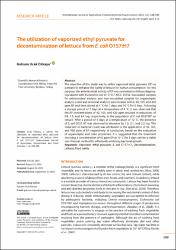Mimar Sinan Güzel Sanatlar Üniversitesi Açık Bilim, Sanat Arşivi
Açık Bilim, Sanat Arşivi, Mimar Sinan Güzel Sanatlar Üniversitesi tarafından doğrudan ve dolaylı olarak yayınlanan; kitap, makale, tez, bildiri, rapor gibi tüm akademik kaynakları uluslararası standartlarda dijital ortamda depolar, Üniversitenin akademik performansını izlemeye aracılık eder, kaynakları uzun süreli saklar ve yayınların etkisini artırmak için telif haklarına uygun olarak Açık Erişime sunar.MSGSÜ'de Ara















